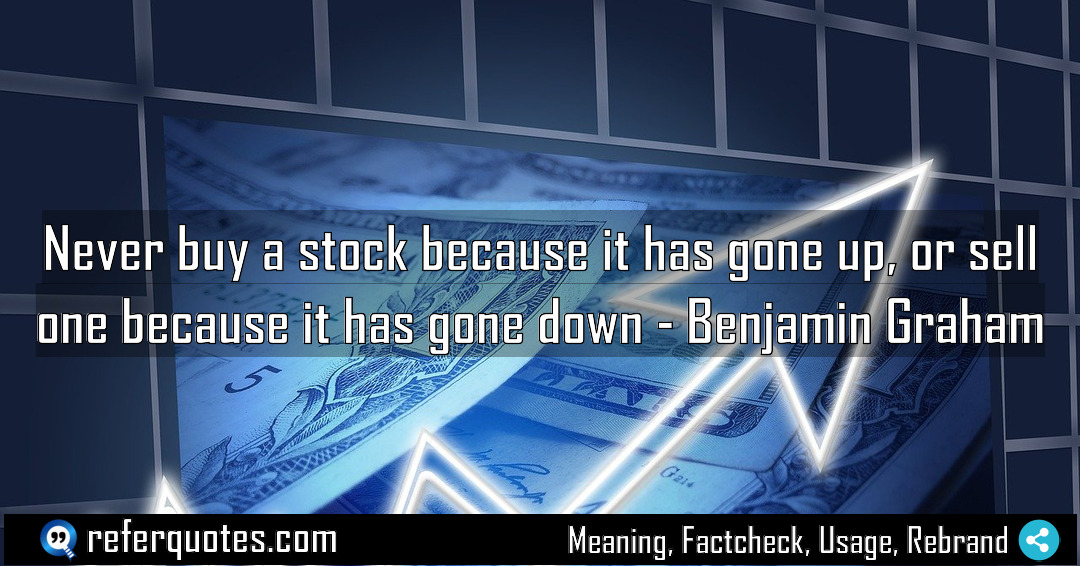
Never buy a stock because it has gone up… it sounds simple, right? But this is the single biggest psychological trap for investors. It’s about fighting your own instinct to chase performance and panic-sell, which is what destroys portfolio returns over the long run.
Share Image Quote:
Table of Contents
Meaning
The core message is brutally simple: Your investment decisions should be based on a security’s intrinsic value, not its recent price action. Don’t let the market’s mood swings dictate your strategy.
Explanation
Look, I’ve seen this play out so many times. When a stock is skyrocketing, it creates this powerful FOMO—this feeling that you’re missing out. Your brain tricks you into thinking the past price increase is a guarantee of future performance. It’s not. It’s often the exact opposite. You’re buying at a peak. And on the flip side, when a quality company’s stock price drops, the panic sets in. You see a number getting smaller and your lizard brain screams “SELL!” But that’s precisely when the true opportunity often lies, provided your original research was sound. Graham is teaching you to be a contrarian, to have the discipline to act against your gut reaction. Your gut is usually wrong when it comes to the market.
Quote Summary
Reading Level70
Aesthetic Score70
Origin & Factcheck
This wisdom comes straight from the 1949 first edition of Benjamin Graham’s “The Intelligent Investor.” It’s not from a random speech or a misattributed Warren Buffett quote (though Buffett is Graham’s most famous disciple). This is the foundational text of value investing, originating from Graham’s work and teachings in the United States post-World War II.
Attribution Summary
Author Bio
Benjamin Graham, well known for investing community has brought investing to masses by focussing on analysis and risk control. After graduating from Columbia University, co-founded the Graham Newman Corporation. Benjamin Graham book list covers Security Analysis and The Intelligent Investor which shaped many generations of professionals. He is regarded as a mentor to Warren Buffett as his ideas form the basis of value investing.
Where is this quotation located?
| Quotation | Never buy a stock because it has gone up, or sell one because it has gone down |
| Book Details | Publication Year/Date: 1949; ISBN/Unique Identifier: 978-0060555665; Last edition: Revised Edition by Jason Zweig (2006), 640 pages. |
| Where is it? | Chapter 8, Approximate page 202 from 2006 edition |
Context
Graham wasn’t just throwing out a catchy line. He was building a whole philosophy of what he called “Mr. Market,” this manic-depressive business partner who offers you prices every day. Sometimes he’s euphoric and offers you a crazy high price, sometimes he’s depressed and offers you a fire-sale price. This quote is your reminder to ignore Mr. Market’s emotional outbursts and focus on the underlying business’s actual value.
Usage Examples
Here’s how this plays out in real life:
- For the new investor: Your friend brags about a meme stock that’s up 200% this month. The urge to jump in is huge. This quote is your anchor. It reminds you that buying after a parabolic move is speculation, not investing.
- For the seasoned portfolio manager: A core holding in your portfolio, a company you’ve deeply vetted, has a bad quarter and drops 15%. The easy thing is to ditch it. This principle forces you to re-evaluate the business, not just the stock price. Has the long-term thesis changed? If not, this might be a buying opportunity, not a reason to flee.
- For anyone feeling the panic: During a market correction, when everything is red, this idea stops you from selling your entire portfolio at the bottom. It gives you the intellectual framework to hold steady or even deploy cash when others are terrified.
To whom it appeals?
Share This Quote Image & Motivate
Motivation Score65
Popularity Score80
Shareability Score75
FAQ
Question: But if a stock is going up, doesn’t that mean it’s a good company?
Answer: Not necessarily. It could be a good company that’s now become an overpriced stock. Or it could be a mediocre company caught in a speculative bubble. The price is just an opinion; the value is the reality.
Question: So should I always buy when a stock goes down?
Answer: No, that’s the other side of the same mistake. The quote says don’t sell just because it went down. You still have to do the work. A stock can go down for a very good reason—like a broken business model. The key is to know the difference between a temporary markdown and a permanent impairment.
Question: Isn’t this just “buy low, sell high”?
Answer: It’s the *psychological manual* for how to actually execute “buy low, sell high.” Everyone knows the phrase, but Graham gives you the tool to fight the emotions that prevent you from doing it. Buying low feels terrible in the moment. Selling high feels like you’re leaving money on the table. This quote is your guide through that.
Similar Quotes
You know, that Benjamin Graham quote about investing only if you’d be comfortable owning a stock without knowing its price… it’s the ultimate litmus test. It forces you to focus…
You know, the real key to making money in stocks isn’t some complex algorithm. It’s the simple, brutally difficult act of not getting scared out of them when the market…
When you buy a stock, you become an owner… it sounds simple, but this single idea from Benjamin Graham flips the entire script on what investing is really about. It’s…
You know, the intelligent investor realizes that stocks become more risky as prices climb, not less. It’s a complete inversion of how most people think, and honestly, it’s the bedrock…
You know, the market’s behavior makes it possible for the investor to do something incredible. It’s all about flipping the script on fear and greed, buying when others are panicking…
